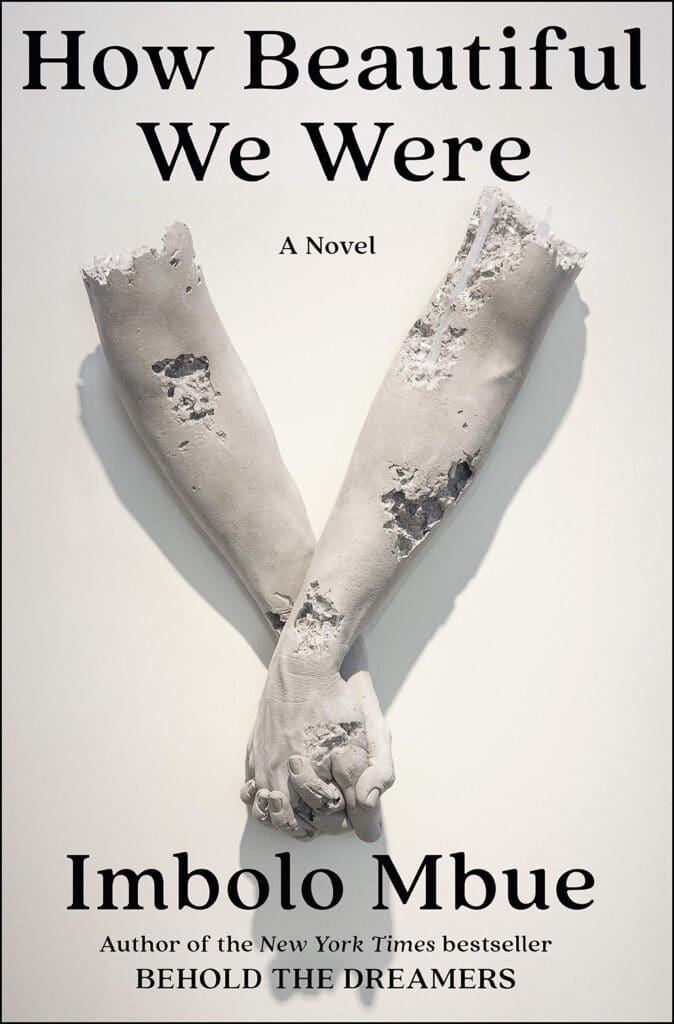In one telling, the story might begin here: the children started getting sick, and nobody knew why. At first, two died within a month. Before long, several more got feverish, then stopped being able to speak, and, soon after, to breathe. Surely, it was said, there must be a common cause. But what was shared between these children? Only the irreducible things: the ground they walked over, the air they breathed, the water they drew from the village well—right where the pipelines ran.
When Imbolo Mbue’s second novel How Beautiful We Were (364 pages; Random House) begins, these things have already happened. It is October 1980 in the fictional African village Kosawa, where the American company, Pexton, has long been at work extracting the vast reserves of oil beneath the town. For the residents of Kosawa—as for most faced with the ravages of environmental injustice today—the question is no longer why children are falling ill, or why the rivers often fill with dark waste. The question, rather, is what can be done?
How Beautiful We Were is an epic chronicle of lives played out under the shadow of this question. The narrative appears in long chapters told by individual villagers and a chorus of children, who speak in a roomy third-person plural—we watched, we mumbled, we inhaled, we remembered, we hoped. Toggling between these viewpoints, Mbue stitches together a panorama of the variable ways Kosawa’s fight for land and livelihood gets related. “It might not feel good to all ears,” goes a well-known town fable, “but our story cannot be left untold.”
What is this story? At the novel’s start, a delegation from Pexton has just arrived in Kosawa, come to assuage concerns about the community’s ailing youth. Villagers fling desperate pleas for help; the oil men offer little in return—just smiles and soundbites. It all seems hopeless. “On most nights,” the children tell us, “we would have left the village square and turned homeward.” (Mbue’s novel often fractures off into such descriptions of what “would have” or “should have” happened: narrative splinters from the trunk of what actually did).
But this night ends differently. In a breath, Konga—the village madman—appears, confessing to have stolen the key to the delegation’s car and, with it, their ability to leave town. From the flurried exchange that follows, an improvised decision emerges: Kosawa will hold Pexton’s men hostage, until the company listens to their demands. “Tomorrow,” Konga promises, as the meeting adjourns and representatives are taken away, “everything is going to change.”
And it does, in a way. Out of this evening spirals a protracted, decades-long conflict that forever marks Kosawa—and violently determines its fate. Guiding us across the years are members of the Nangi family, standing in as proxies for the village as a whole. Eldest is Yaya, the grandmother, through whom the novel maintains a firm grounding in Kosawa’s colonial past, as it haunts their on-going fight for their land. Yaya thinks back to men arriving from the coast “looking for humans to snatch and sell,” and, elsewhere, recalls decades of forced labor in rubber plantations. “Nowadays,” the elderly woman sighs, “young people talk about the oil as if it’s our first misfortune.”
In How Beautiful We Were—as in a good deal of contemporary fiction about climate issues—the focus is on those young people. Mostly, we follow a girl named Thula: grandchild of the Nangi family, as well as a member of the young chorus. Through her, Mbue freely postures into a youthful awe—one of many strategies used throughout this novel to underscore the severity of Pexton’s imposition onto the village land. “I ask Papa if the pipelines… have an end,” Thula says, wide-eyed, at one point. “They seem to run on forever.”
As Thula grows older, her perspective widens, and so do the moral questions of the novel. Among those in Kosawa, there is no shared answer about what ought to be done. Should the villagers meet with foreign journalists, who say they hope this will be the “rare story…to get a happy ending”? Is it wise to trust the advice of American activist groups, with their firm insistence that change comes about through “dialogue, negotiation, common ground”? Or maybe there has been enough negotiation. Maybe, as Thula—now a radical college student in America—begins to argue, “what we need to do is fight.”
Mbue wisely avoids any prescriptive authorial claims about which of these avenues is most ethical, or more effective. What might have become a tidy blueprint for social resistance—complete with the “happy ending” those journalists raised—instead evolves into something more wounded, and less certain: an exacting account of what survives in the face of justice deferred. Even as Kosawa grows uninhabitable—too contaminated, too dangerous—there are still villagers who ask, as they always have: “What do we do now?”
The story began with the words of the children: “We should have known the end was near.” By the novel’s close, those youth are now aging adults, many with grandchildren of their own. They recall Kosawa—that “splendid piece of the earth”—and think of its beauty: how the sky sang with thunderous songs in the dry seasons, how the moon was full on a night of dancing in the square. Then, their grandchildren approach. “Please, Yaya, please, Big Papa,” the young ones insist, “tell us a story.” Even at the end, a beginning.

